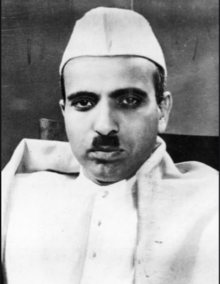U. N. Dhebar | |
|---|---|
 | |
| Chief Minister of Saurashtra | |
| In office 1948–1954 | |
| Preceded by | Office Established |
| Succeeded by | Rasiklal Umedchand Parikh |
| President of the Indian National Congress | |
| In office 1955–1959 | |
| Preceded by | Jawaharlal Nehru |
| Succeeded by | Indira Gandhi |
| Member of Parliament | |
| In office 1962–1967 | |
| Preceded by | Khandubhai Kasanji Desai |
| Succeeded by | Minoo Masani |
| Constituency | Rajkot |
| Personal details | |
| Born | Uchharangrai Navalshankar Dhebar 21 September 1905 Gangajala, Nawanagar State, British India |
| Died | 11 March 1977 (aged 71) |
| Political party | Indian National Congress |
| Occupation | Lawyer, politician |
Uchharangrai Navalshankar Dhebar (21 September 1905 – 11 March 1977) was an Indian Independence activist who served as the Chief Minister of Saurashtra State from 1948 to 1954 and the President of the Indian National Congress from 1955 to 1959.[1]
Between 1938 and 1942, Dhebar led the Rajkot Satyagraha and actively participated in the Individual Satyagraha and Confederation Movement. For his role in the Indian independence movement, he was imprisoned thrice by the British colonial government, for two short spells during 1938-1939 and 1941 and later for three years from 1942 to 1945.[2] In 1959, Dhebar was the head of the Planning Sub-Committee of the All India Congress Committee and from 1960 to 1961,[3] he was the Chairman of the Scheduled Castes and Scheduled Tribes Commission of the Government of India.[4] In 1962, he was elected to the third Lok Sabha from Rajkot.[5][4] In 1962, Dhebar was elected as the Chairman of the Khadi and Village Industries Commission of the Government of India. In 1973, he was awarded the Padma Vibhushan award, India's second-highest civilian honor.[6]
- ^ "Second Term For Mr. Dhebar: Congress Presidentship". The Times of India. 18 December 1957.
- ^ Cite error: The named reference
:4was invoked but never defined (see the help page). - ^ Cite error: The named reference
:12was invoked but never defined (see the help page). - ^ a b Cite error: The named reference
:8was invoked but never defined (see the help page). - ^ "Indian National Congress". Indian National Congress. Retrieved 29 November 2020.
- ^ "Padma Awards | Interactive Dashboard". www.dashboard-padmaawards.gov.in. Retrieved 29 November 2020.